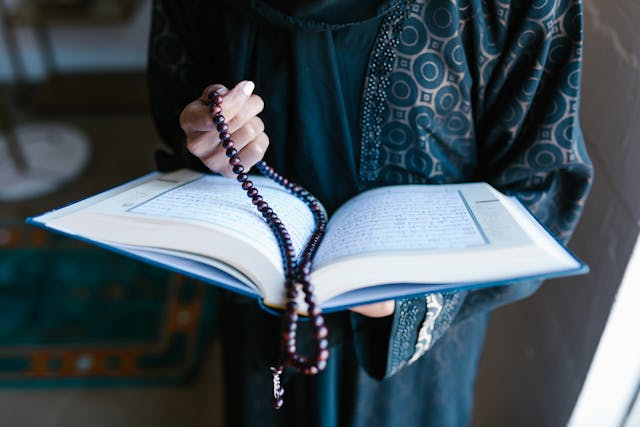Exploring the Significance of the Qur’an during Ramadan: A Spiritual Journey

The ninth month of the Islamic lunar calendar, Ramadan, is a very important time for Muslims all around the world. This month is devoted to fasting, introspection, prayer, and spiritual development. The Qur’an, the sacred text of Islam, is essential to the celebration of Ramadan and has a special place in Muslims’ hearts and thoughts during this holy month. We’ll examine the connection between the Qur’an and Ramadan in this blog post, as well as the reasons why this sacred text is so essential to the month-long celebration.
The Qur’an: A Source of Guidance and Inspiration: Muslims consider the Qur’an to be the authentic word of God, revealed to the Prophet Muhammad (peace be upon him) over a 23-year period. It provides a thorough manual for leading a decent life that addresses issues of faith, morality, the law, and spirituality. Muslims all throughout the world recite and consider the Qur’an with greater fervor and sincerity during Ramadan.
Recitation of the Qur’an during Ramadan: Long recitations of passages from the Qur’an occur every night during the Taraweeh prayers, which are one of the most notable aspects of Ramadan. During the month of Ramadan, Muslims try to recite the entire Qur’an in 30 days, breaking it up into manageable chunks. As believers gather in mosques for communal worship, this practice not only deepens one’s relationship with the Qur’an but also promotes a sense of community and oneness.
Reflection and Contemplation: Muslims have a great opportunity throughout Ramadan to think and consider the lessons found in the Qur’an. Fasting from sunrise to sunset creates a spiritually elevated atmosphere that enables devotees to turn inward and consider the knowledge found in the sacred texts. The Qur’an itself encourages reflection, as it states: “Do they not reflect upon the Qur’an, or are there locks upon [their] hearts?” (Qur’an 47:24)
Seeking Guidance and Enlightenment: For many Muslims, Ramadan is a time for self-improvement and spiritual renewal. The Qur’an is a wellspring of wisdom and insight that offers solutions to the challenges and issues of life. In order to confront life’s obstacles with faith and fortitude, believers turn to its chapters for direction and strength.
Acts of Worship and Charity: In addition to reciting and reflecting on the Qur’an, Ramadan is a time for increased actions of prayer and almsgiving. The Qur’an emphasizes the importance of kindness and compassion toward the impoverished, particularly during the month of fasting. Muslims are encouraged to align their actions with the principles of the Qur’an by contributing to charitable causes, helping the underprivileged, and pursuing social justice.
The Qur’an: A Divine Revelation: For Muslims, the Qur’an is the ultimate life guide, not just a text. It’s thought to be the actual word of God, given to the Prophet Muhammad by the angel Gabriel during a twenty-three-year period of time. All facets of human life are covered by the Qur’an, which offers direction on issues of faith, morality, the law, and spirituality. Believers of all ages can find knowledge and comfort in its verses, which are regarded as ageless and pertinent.
Ramadan: A Month of Spiritual Intensity: Ramadan is a time of increased devotion and spiritual awareness. Muslims abstain from food, drink, and other necessities of life during their fast, which lasts from sunrise to dusk, with the goal of cleansing their souls and becoming closer to Allah. It’s a time for introspection, heightened prayer, almsgiving, and charitable deeds. The practice of fasting develops self-control, patience, thankfulness, and empathy for others who are less fortunate.
The Qur’an and Ramadan: A Symbiotic Relationship: The Qur’an and Ramadan have a symbiotic relationship whereby each benefits the other in Muslims’ spiritual journeys. Muslims aspire to strengthen their relationship with the Qur’an during Ramadan by increasing their recitation, contemplation, and study of the text. During this month, many people try to finish reciting the full Qur’an, breaking it up into daily chunks known as “juz” to recite throughout the month.
During Ramadan, Muslims have the chance to study the Qur’an together during Taraweeh, the nocturnal prayers. Worshippers frequently find great spiritual resonance and oneness in the verses said during these prayers.
Furthermore, the Qur’an itself emphasizes the significance of Ramadan during this time by describing it as the month in which it was revealed:
“The month of Ramadan [is that] in which was revealed the Qur’an, a guidance for the people and clear proofs of guidance and criterion.” (Qur’an, 2:185)
Throughout Ramadan, Muslims find comfort, direction, and inspiration in the Qur’an. Its passages provide consolation during difficult times, inspiration during moments of uncertainty, and reassurance about the benefits that await those who hold fast to their faith and morality.
During Ramadan, Muslims perform “Tafsir,” or Quranic exegesis, in addition to recitation and introspection. Tafsir is the study of Qur’anic verse interpretations and meanings under the supervision of scholars or via introspection. This enhances the spiritual significance of Ramadan and broadens our comprehension of the text’s applicability to modern life.
The Qur’an’s importance during Ramadan goes beyond its use as a source of spiritual instruction. It also acts as a stimulant for social solidarity and communal connection. Muslims get together for communal prayers and iftars, the meal to break the fast, during the month, which strengthens the bonds of brothers and sisterhood among believers.
During Ramadan, the Qur’an is not just recited in mosques and private homes. The sweet sound of the Qur’an being recited fills the air in many Muslim-majority nations, as radio and television stations show special programs with well-known Qur’an reciters. No matter where they are or what their circumstances are, Muslims all around the world can connect with the Qur’an and its message thanks to these transmissions.
Moreover, Ramadan gives Muslims a chance to perform deeds of kindness and satisfy their Zakat (required almsgiving) obligations. The significance of compassion and almsgiving to the less fortunate is emphasized throughout the Qur’an, especially during Ramadan:
“The example of those who spend their wealth in the way of Allah is like a seed [of grain] which grows seven spikes; in each spike is a hundred grains. And Allah multiplies [His reward] for whom He wills.” (Qur’an, 2:261)
Muslims from throughout the world step up their efforts to help people in need during Ramadan, motivated by these beliefs. There are many acts of charity, ranging from feeding the hungry to giving the poor financial support, which reflects the compassion and generosity encouraged by the Qur’an.

Moreover, the fast of Ramadan instills a heightened sense of empathy and solidarity among Muslims. By experiencing hunger and thirst firsthand, believers develop a deeper appreciation for the blessings bestowed upon them and a greater awareness of the struggles faced by the less fortunate. This shared experience fosters compassion, unity, and a collective sense of responsibility towards one another, echoing the Qur’anic injunction to “cooperate in righteousness and piety” (Qur’an, 5:2).
In summary, Ramadan and the Qur’an are woven into the communal and spiritual fabric of Muslim life. Muslims are reminded of the Qur’anic lessons of faith, charity, and social justice as they study the book during this auspicious month. Muslims become more deeply connected to their faith, fortify their ties to the community, and exemplify Islamic principles in their day-to-day lives by reciting, reflecting upon, and acting upon the inspiration of the Qur’an. Muslims use the holy month of Ramadan to reaffirm their dedication to the values of righteousness, compassion, and service to mankind found in the Qur’an. This enriches their spiritual journey and promotes the development of a society that is more compassionate and just.


One Comment
Ibrahim
March 6, 2024 AT 6:52 pmSuch informative.